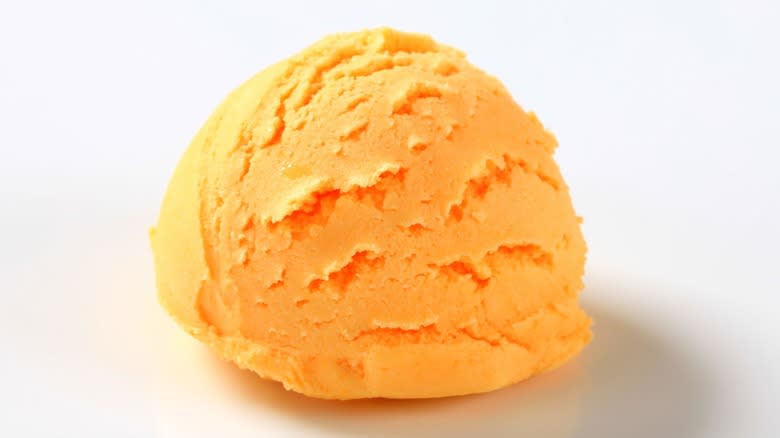Why Is 'Sherbet' Pronounced As 'Sherbert'?

When you're taking a lengthy shower, enduring a boring meeting, or sitting on a long bus ride, the mind tends to wander. Sometimes, it lands on questions that you didn't realize needed answering, but now that they've entered your mind, you can't rest properly until you get to the bottom of them. "Is a hotdog a sandwich?" you wonder, sweating. Or, "Where do pond fish go during the winter?"
Now, you're standing at the window in the middle of the night, and you can't even hear it when your partner asks if you're coming to bed. One question is booming too loudly in your mind: Why is "sherbet" pronounced as "sherbert?" As it turns out, it's not just a matter of colloquial vernacular preference. "Sherbet" vs. "sherbert" goes deeper than quirky regional idiosyncrasies.
Technically, once and for all, "sherbet" is the correct pronunciation. But, according to the authorities at Merriam-Webster, "sherbert" is a fully established official variant spelling. It isn't "wrong" to call it "sherbert" at all. Still, that hasn't stopped many foodies from getting downright heated about this frozen dessert. The title of one Smithsonian Magazine article even laments "It's Sherbet, Not Sherbert, You Dilettantes." So, why did foodies give the same dish two different names in the first place?
Read more: 25 Best Ice Cream Brands Ranked
Americans Just Really Like Words That Rhyme

Over the years, words evolve and take on different meanings. Even the word "grocery" has referred to everything from general stores to bars. Per the lore, modern sherbet (pronounced "SHUR-bit") evolved from a proto-frozen treat called sharbat, which was enjoyed by Persian foodies and made from fruit juice and sweetener chilled in snow.
"Sharbat" comes from the Arabic "sharbah," meaning "a drink," and "sherbet" subsequently evolved. These root words notably lack an "r" in the second syllable. But, whatever the reason, the word "sherbet" began cropping up in the English language sometime during the early 17th century -- and foodies way back then were already calling it "sherbet" and "sherbert" interchangeably.
At the end of the day, it could just come down to the intrinsic human disposition to favor rhyming consonants, as demonstrated by the 1939 Edythe Wright hit "Shoot the Sherbet to Me Herbert," in which "sherbet" is pronounced to rhyme with "Herbert" with the addition of the "r" in the second syllable. This anthem could have helped cement "sherbert" as the technically erroneous but nonetheless widespread mispronunciation of the word for keeps.
Ordering Sherbet Could Get You A Different Dessert Entirely In The U.K.

Luckily, in America, whether you pronounce it "sherbet" or "sherbert," folks will know what you're talking about and you'll get the same frozen treat either way. Sherbet (not to be confused with sorbet) is a combination of frozen fruit plus an additive of either milk, egg white, or gelatin.
But, order a cup of "sherbet" at a parlor in the U.K., and you'll probably get a treat closer to sorbet, which is less rich and made without eggs. Per U.S. regulation, sherbet must contain 1% to 2% butterfat, while in the U.K., sherbet is a type of powder used to make a fun, sweet drink. Sorbet, on the other hand, contains no dairy at all. And then there's ice cream, which has 10% butterfat or more.
The subreddit r/AskAnAmerican asked which way folks in the States pronounce it, and the answer was overwhelmingly "sherbert." Quoth one Redditor, "I know there isn't an 'R' in the second syllable ... but there is. I've never met an American who says it without." As another comment elaborates, "I'll pronounce 'sorbet' as 'sore-bay.' I know the sherbet pronunciation is wrong because there's no second 'r' in it, but it feels weird otherwise."
Read the original article on Tasting Table.

